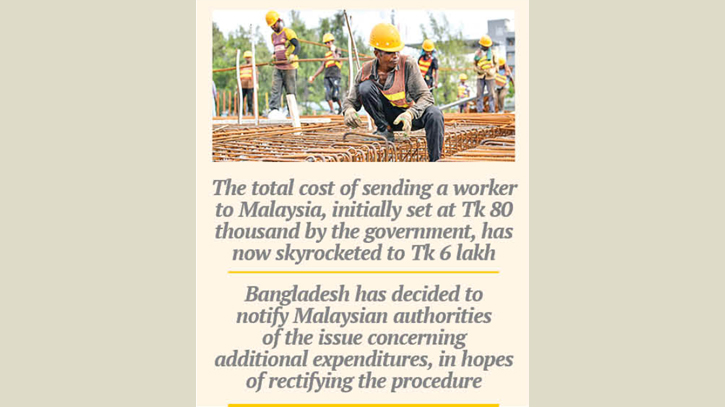
Photo : Messenger
Recruiting agencies are grappling with the challenge of sending workers to Malaysia as costs continue to soar, potentially shattering the dreams of those aspiring to work in a country that is the first choice for many Bangladeshi workers.
The total cost of sending a worker to Malaysia, initially set at Tk 80 thousand by the government, has now skyrocketed to Tk 6 lakh. In simpler terms, the sevenfold increase in expenses is demotivating and discouraging workers.
Mohammad Abul Bashar, President of the Bangladesh Association of International Recruiting Agencies (BAIRA), an organisation of labour exporters, explained, "We have to compete with countries like India, Nepal, or Pakistan for bringing job demand letters from Malaysia. As a result, we have to negotiate at some points, overlooking the contract. Moreover, most Bangladeshi workers going to Malaysia are unskilled and can only communicate in Bengali. This necessitates the appointment of one supervisor for every 20 to 25 Bangladeshi workers at the workplace, and the cost of this is covered by the employer through the recruiting agencies. Furthermore, airfares have increased, and the health examination fee has surged from Tk 2500 to Tk 10000. The cumulative effect of these factors is driving up immigration costs."
According to reliable sources, at least 3 lakh Bangladeshi workers have made their way to Malaysia in the last year with hopes of changing their fortunes. However, the situation this year till now has been entirely different. The Ministry of Expatriates' Welfare and Overseas Employment finds that while the middle-class youth of the country may be content in one aspect, they are discontented in another. This is because immigration costs in Malaysia have significantly increased due to various factors, including visa and platform fees. The increased immigration costs are already starting to shatter the dreams of Bangladeshi workers once they arrive in Malaysia. Given this situation, Bangladesh has decided to notify Malaysian authorities of the issue concerning additional expenditures, in hopes of rectifying the procedure.
Recruiting agencies have informed that the cost of sending Bangladeshi workers to Malaysia, covering all activities, is approximately Tk 80 thousand. However, the immigration cost is escalating due to extra fees imposed by the Malaysian authorities. The Malaysian government system requires recruiting agents to pay 100 Ringgit (Tk 2350 approx.) per worker for clearance. The major issue, though, is the visa process, as recruiting agencies charge 4 to 5 thousand Ringgit for each visa, equivalent to more than Tk 1 lakh on average.
Additionally, a fee of Tk 1 lakh 40 thousand to Tk 1 lakh 60 thousand must be paid for the Malaysian platform. These funds need to be sent in foreign currency. On the other hand, although the employer is theoretically responsible for the airfare, it is now being borne by the employee, having more than doubled. All in all, the cost of immigration has surpassed Tk 6 lakh.
An office order on July 5, 2022, by the Ministry of Expatriates' Welfare and Overseas Employment stated that the maximum cost for a Bangladeshi worker going to Malaysia should be Tk 78,990. Airfare to Malaysia and other expenses will be covered by the employer, and the expenses incurred within Bangladesh should be the responsibility of the worker. According to the agreement between Bangladesh and Malaysia, the cost of 15 fields, including airfare, the Malaysian Immigration Department's 'security deposit,' insurance, health check-up in Malaysia, immigration security clearance, and coronavirus testing, should be covered by the respective hiring authorities.
However, in reality, the situation is entirely different, with each worker spending at least Tk 6 lakh. This is demoralising the workers. While those with financial means remain enthusiastic, those attempting to secure loans in various ways are losing interest in Malaysia. This is having a negative impact, and many fear that if this issue is not resolved soon, the sending of workers to Malaysia will cease.
Senior Secretary of the Ministry of Expatriates' Welfare and Overseas Employment, Dr. Ahmed Munirus Saleheen, said, “Bangladesh has no control over some systems, including visa procurement, as these were approved and implemented by the Malaysian government. To address this situation, it has been decided to discuss with the Malaysian government to replace the existing system with a new one. In the meantime, the Malaysian authorities have been informed."
Messenger/Imran/Disha








